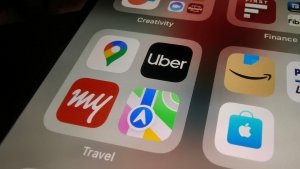Digital disruptors have punched holes in the global offline economy, but will the law catch up with them in 2017?
Is This The End Of The App Economy?
Digital disruptors have punched holes in the global offline economy, but will the law catch up with them in 2017?

Since the introduction of Airbnb in 2008 and Uber in 2009, businesses all around the world have looked to emulate the highly successful business models that have allowed these organisations to thrive.
As ever more industries have adopted the approach of these so-called “digital disruptors”, we have witnessed a torrent of intuitive new start-ups shaking up the market and laying the groundwork for a brand-new "app economy”.
From retail to hospitality, transport to travel, applications such as Taskrabbit, Uber and Deliveroo are changing the way we think about business, cutting costs and improving experiences for the end customer.
Or so we thought.
In reality, a very different picture has started to emerge, with digital “disruption” proving far more costly, and far less sustainable, than we had originally hoped.
When asked why the likes of Uber and Airbnb have proved so successful, many business leaders claim that their good fortune is simply a result of the great customer experiences that such apps provide.
But while apps like Uber do provide fantastic user experiences, that alone is not what has made them so universally successful. Instead, what makes these disruptors disruptive is that they aren’t shackled by the same rules and regulations as their offline competitors.

Judges were busy in 2016 deciding whether app owners should do more for the people who work for them
Rather than “disrupting” existing markets, it turns out that many of the new app economy business models didn’t really tear up the rulebook, they simply ignored it.
By positioning themselves as “applications” and “digital services”, they tried to convince the world that they were something entirely new, something which did not have to bow down to the rules and regulations of other brands competing within the same space.
By defining themselves in this way, digital disruptors were able to avoid the costly legislation and heavy responsibilities that come with running a traditional business. According to this model, Uber is not a transport provider, Airbnb is not a rentals firm and Deliveroo is not a delivery company.
Instead they are all nothing more than facilitators, providing intuitive applications that allow people to conduct work - be it renting a room, delivering a takeaway or driving a taxi – in a low cost and flexible way.
While on the surface, this may sound like a much-needed approach to flexible working, the problem comes when these digital disruptors are asked to accommodate traditional business standards such as guaranteeing workers’ rights, providing a living wage, or holding any corporate accountability on the part of the brand.
As a result of this system, when in 2014 one of Uber’s drivers knocked down and killed a six-year-old girl, Uber could attempt to deny responsibility as the driver wasn’t an Uber “employee”. In fact, despite having over 160,000 drivers, Uber technically only has just over 6000 employees.
Similar issues have been seen with Airbnb, which – unlike traditional holiday rental firms – does not have to guarantee any real standards of health or safety for its apartments or guests. In 2015, this lax attitude resulted in the death of a guest when adequate smoke detectors were not fitted in a holiday apartment.
As with Uber, this raises significant questions about the dichotomy between the company’s stated role as an “app provider” and its increasingly powerful position as an international rentals brand.
This belief that applications exist outside the rules and regulations of traditional businesses can now be found across much of the digital landscape, ultimately resulting in a Wild West of unregulated digital disruption.
To understand how far this mentality has gone, try to imagine how the world would react if traditional offline businesses acted in the same way that digital disruptors do online? Imagine if Stagecoach refused to pay its drivers minimum wage, or if BT sold private communications data in the way that Facebook does?
Even Amazon is now undertaking the sort of predatory business tactics that - had they been conducted by offline brands such as Walmart or Gap - would have led to people protesting at the storefront.
This is the reality of digital disruption, and it’s a reality that is swiftly coming to an end.
In October 2016, Uber lost its first landmark tribunal, with UK courts telling the firm that it must provide drivers with basic working rights and the national minimum wage. Similarly, public pressure has now forced Airbnb to install smoke alarms and carbon monoxide detectors, treating their apartments as closer to the hotels of a traditional travel firm.
As we move into 2017, all of these changes are helping to set a new precedent for app-based businesses and digital disruptors online. As governments, regulators and industry bodies all start to crack down on the new generation of businesses, we are reminded that just because something exists on the internet, does not mean that it exists outside of the law.
While there is always going to be a place for the $50bn app economy, multinational organisations such as Uber and Airbnb are going to be forced to significantly rethink their business models in the year ahead.
For those that don’t, the disruptors will rapidly become the disrupted.
Alex Warren is a technology PR professional at Wildfire and the author of Technoutopia.
Thanks for signing up to Minutehack alerts.
Brilliant editorials heading your way soon.
Okay, Thanks!



